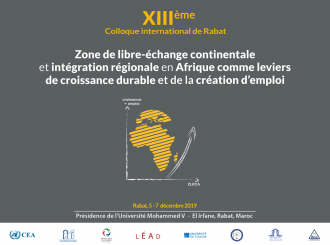
Rabat, 5 December, 2019 - The Economic Commission for Africa, the WTO Chair of the Mohamed V University of Rabat and their partners launched on Thursday 5 December the 13th International Colloquium of Rabat under the theme: "The Continental Free Trade Area and Regional Integration in Africa as Drivers for Sustainable Growth and Job Creation".
From 5 to 6 December, the colloquium will enable academics to examine the opportunities offered by the African Continental Free Trade Area (AfCFTA), its implementation process and various regional integration cases.
"In addition to its potential ability to boost trade and FDI, the AfCFTA is expected to help generate the conditions for inclusive and sustainable growth in our countries," said Azzedine Ghoufrane, Dean of the Faculty of Legal, Economic and Social Sciences - Souissi and WTO Chair of Mohamed V University of Rabat in his opening speech.
The AfCFTA was born in an economic context characterized by a slowdown in global growth. Its effective implementation is expected to help provide African countries with new opportunities to diversify their economies, improve their productive systems and reorient them towards more sophisticated, higher value added processes, and reduce their dependence on a limited number of trading partners by reorienting them towards growing markets near them.
"The AfCFTA is an opportunity to step up regional integration and accelerate structural transformation in Africa. We believe that it can also help strengthen the competitiveness of African economies and generate hundreds of thousands of jobs," said Khaled Hussein, head of the Sub Regional Initiatives Section at the ECA office for North Africa.
"Our work has shown that all African sub-regions will experience an increase in industrial and intermediate goods exports. This will enable them to achieve greater horizontal diversification and insertion in regional and global value chains, which is a catalyst for industrialization and structural economic transformation," said Mustapha Sadni Jallab, Head of the training and Research division of the African Institute for Economic Development and Planning (IDEP, ECA).
In addition to the publication of numerous studies on the impact of the AfCFTA in Africa (macroeconomic determinants in Africa, employment, labor mobility, poverty eradication etc.) and the design of online modeling tools, ECA is presently seeking to facilitate the implementation of the AfCFTA, assess its impact, and is actively supporting the design of national strategies that will enable countries to seize the opportunities offered by the AfCFTA.
"The WTO’s multilateral approach and regional initiatives such as the AfCFTA complement each other as their common objective is to benefit from trade and contribute to sustainable and inclusive growth strategies," said WTO representative Saïd El Hachimi.
El Hachimi added that his organization is following Africa’s integration process with interest : "If the AfCFTA succeeds, it will be a landmark agreement given the number of member countries, but also because of its sustainable & inclusive growth and job creation goals," he said.
In conclusion, Abdelmounaim El Gueddari, Director of the Laboratory of Legal and Political Research Studies and Research (LERJP) of the Mohammed V University of Rabat, expressed the hope that, at a time when many free trade agreements tend generate to trade balance deficits for developing countries, the AfCFTA will help address such shortcomings by strengthening South-South trade.
The 13th edition of the Rabat International Colloquium has been jointly organized by the WTO Chair of the Mohammed V University of Rabat and the WTO Chairs Program, the Economic Commission for Africa (ECA), The Faculty of Legal, Economic and Social Sciences of Souissi (Rabat), the Laboratory of Applied Economics for Development (LEAD) of the University of Toulon (France) and the Laboratory of Studies and Legal and Political Research (LERJP) of the Mohammed V University of Rabat.
This event is an opportunity for participants to analyze various issues related to the AfCFTA and its implementation, regional integration, economic diversification, structural and institutional transformation, regional value chains creation or opportunities for multilateral cooperation to support African economies’ transformation and diversification process.
"Human Capital, Economic Growth and International Trade in Africa", a book produced following the 12th International Colloquium of Rabat will be presented to participants at the closing of the conference on 6 December.
Following the 13th Colloquium of Rabat, a doctoral seminar will be held on 7 December for young researchers working on topics related to its theme, as well as economic, social and political issues of interest to Southern Mediterranean and African countries.
Issued by
Communication Team
Economic Commission for Africa
Office for North Africa
Tel: +212 (0) 537 548 749
Email: filali-ansary@un.org; cea.an.coms@gmail.com